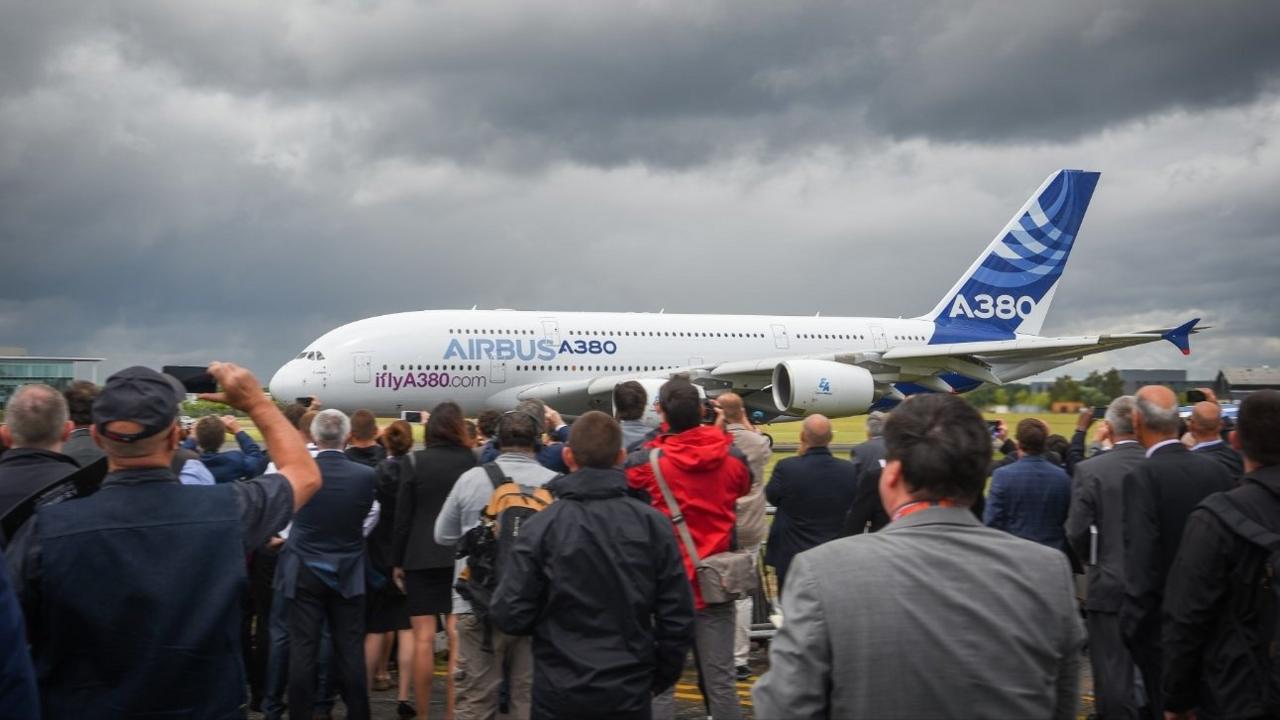Farnborough Airshow: Brexit storm clouds fail to gather
- Published
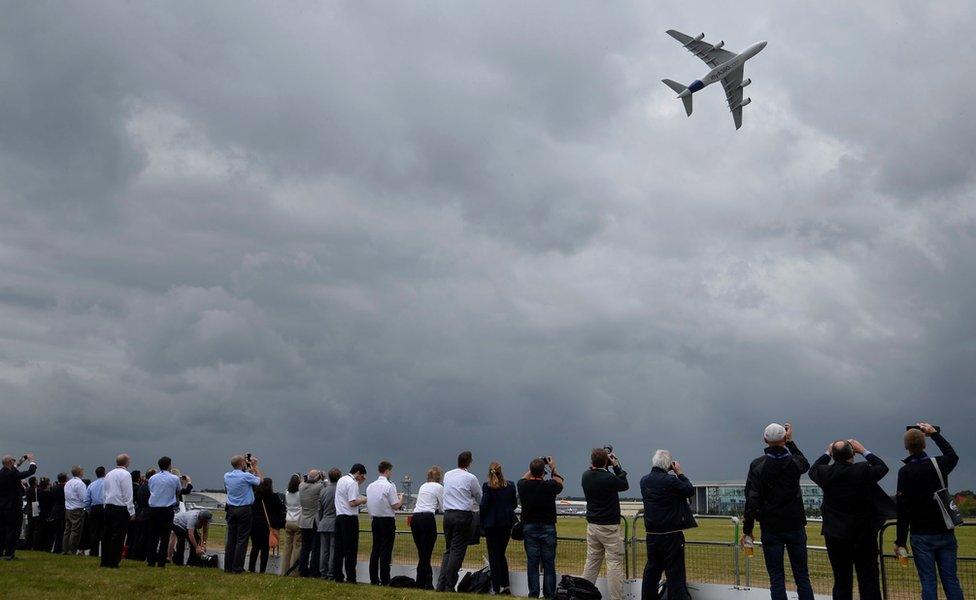
Plane enthusiasts watch an Airbus A380 - before the rain came down
Brexit was supposed to cast storm clouds over this week's Farnborough Airshow. Instead, it's been two days of torrential rain that has cast the real shadow over proceedings.
The biennial event is where the world's aerospace and defence (A&D) companies come to talk - and do - business.
And, in an industry where cross-border co-operation is vital, much of that talk was forecast to focus on the dire consequences for British A&D in a post-referendum world.
Yet, this being Britain, it's the weather that seems to be the main topic on everyone's lips. Evidence of serious concern about Brexit at this international gathering of executives and military top brass was thin on the ground (publicly, at least).
Take comments from the Pentagon's chief buyer of weapons, US Defense Under Secretary Frank Kendall.
"I don't see any reason why it should fundamentally affect our relationship with the UK or our business deals with the UK," he said.
British quality
UK and US defence interests are inextricably linked. BAE Systems, the UK's largest arms manufacturer, has a big presence in the US and is a key contractor on the world's most expensive defence programme, the US-led F-35 Joint Strike Fighter project.
"We can be an ultimate tactician while we're flying," says F-35 chief test pilot Alan Norman
BAE is also lead contractor on the Eurofighter Typhoon programme, a pan-European project involving defence giants across the continent.
Does Brexit put these in doubt? "I personally don't think it does," Ian King, BAE System's chief executive, told the BBC. "We don't trade with the EU as a defence entity, it's with individual nations."
He says that the quality of UK technology and capabilities will always be in demand internationally, especially given that defence and security have risen rapidly up the political agenda.
BAE had backed continued EU membership. "It was right for the UK to stay part of a coherent trading bloc," he said.
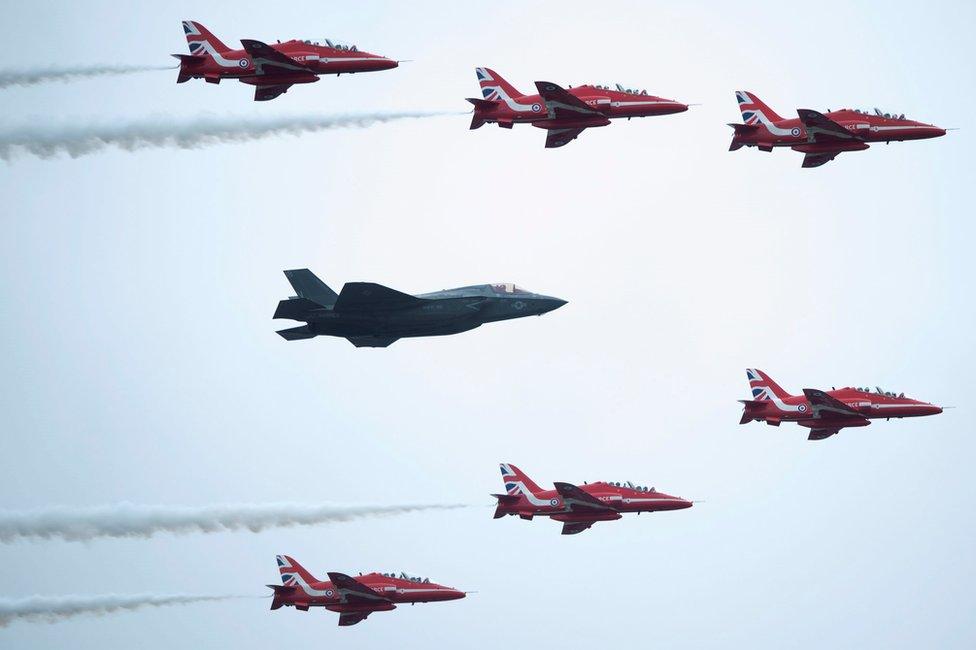
The Red Arrows: Britain on display
And he still wants to see a trade deal done that involves the free movement of capital and people. But now that the British people have spoken, the strategy is to see what can be done "to maintain that continuity in a different form".
Boeing investment
That's the view among British A&D companies generally.
The overwhelming majority of firms wanted to Remain, according to a survey conducted before the referendum by ADS Group, the industry's trade body.
They cited access to the European supply chain, skills, and R&D funding among the key benefits.
All that is history, though. The challenge now, according to ADS chief executive Paul Everitt, is to achieve continuity - and ram home the message that the UK is open for business.
"We are the largest aerospace and defence market in Europe," he said. "The government needs to send a strong signal about the attractiveness of the business environment here."
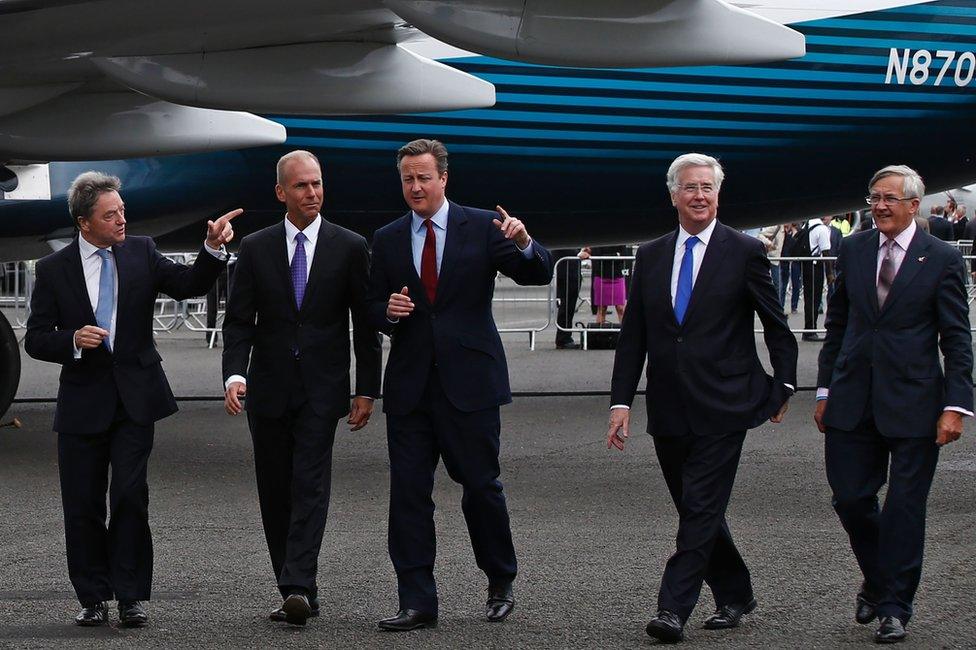
David Cameron talks to Boeing's Dennis Muilenburg (second left) - both men signalled their commitment to the UK-Boeing partnership
Prime Minister David Cameron tried to do exactly that at the start of the show, in what looked like a carefully choreographed announcement about Boeing's commitment to the UK.
The UK government is buying nine Boeing maritime patrol aircraft as part of a £3bn, 10-year partnership that involves generating 2,000 jobs.
Boeing will also deliver 50 Apache attack helicopters to the British Army.
"Whatever uncertainties our country faces, I want the message to go out loud and clear: the UK will continue to lead the world in both civil and defence aerospace," Mr Cameron said.
"We aren't just open for investment, we are a place the global aerospace industry wants to do business - as Boeing's long-term partnership with the UK proves."
'No change'
Boeing's chairman Dennis Muilenburg duly reciprocated. "Boeing is committed to the UK government's prosperity agenda and we share the goals of enhanced economic growth that the prime minister has set," he said.
Boeing has doubled its presence in the UK over the past five years, and "we don't really see our plans changing," Mr Muilenburg added.
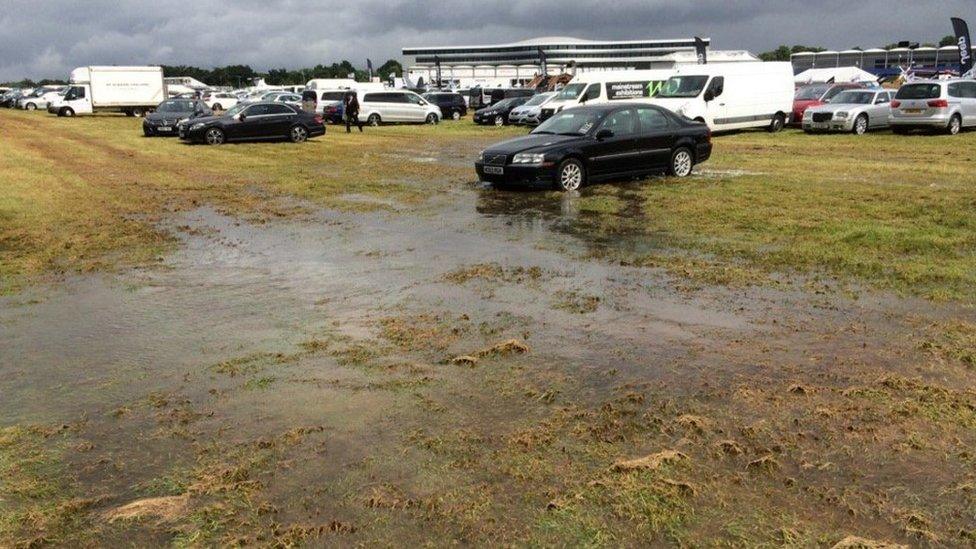
Flooding led to the early closure of the show on Monday but international companies suggested trade with the UK would not get bogged down by Brexit
There was a similar message from Raytheon International, the US missiles and electronics company which has a big UK presence.
Its chief executive, John Harris, called Brexit a "long play". He told the BBC: "We do not see any immediate impact... The process will take years once Article 50 is filed."
Raytheon would adapt to market changes, he said. But the critical issue "is to ensure we remain a trusted partner of the UK government".
Among major European companies, too, pre-referendum worries are giving way to post-referendum pragmatism.
"We are where we are," said one executive, who had previously privately warned that a Leave vote would be "economic stupidity".
"Aerospace is a long-term game. If - and I stress 'if' - there are strategic changes, they will be a long way down the road," he said.
Mauro Moretti, chief executive of Italy's Leonardo - formerly Finmeccanica - was especially upbeat about his company's UK operations, which include AgustaWestland helicopters.
He said: "We would like to invest [in the UK]. We have in the UK very important facilities. We have a very highly-skilled workforce.
"We would like to maintain our presence - to increase our presence," he added.
Chinese 'friend'
Yet, as the marketing manager of one small UK aerospace supplier pointed out: "It's easier to maintain trade if you are a big defence contractor dealing with governments. It's going to be more difficult if you are further down the supply chain."
He didn't want to be named - "it's not in my commercial interest" - but his company supplies equipment that ends up on both Airbus and Boeing aircraft. "I think the uncertainty that is created by leaving the EU is magnified if you are a smaller player in this industry," he said.
The message from the Brexiteers is that business will soon be unshackled from EU regulations that hindered the pursuit of more opportunities in the wider world.
At Farnborough, with its 1,500 exhibitors and 100,000 trade visitors, companies from all corners of the world are touting for business and doing deals.
China's aviation expansion ambitions
Among these is China, which has its biggest ever presence at the air show. With its huge aerospace and airline ambitions, China wants to do more business with Britain, says Xu Jin, a minister at the Chinese embassy in London.
"The British should not worry about China not being your friend after Brexit," he told a conference on aerospace opportunities in his country.
So, China won't desert Britain when it leaves the EU? "Never. This is never going to happen. China is always going to be your friend."
'You're all Europeans'
Another international perspective came from Akbar Al Baker, chief executive of one of aviation's major players, Qatar Airways.
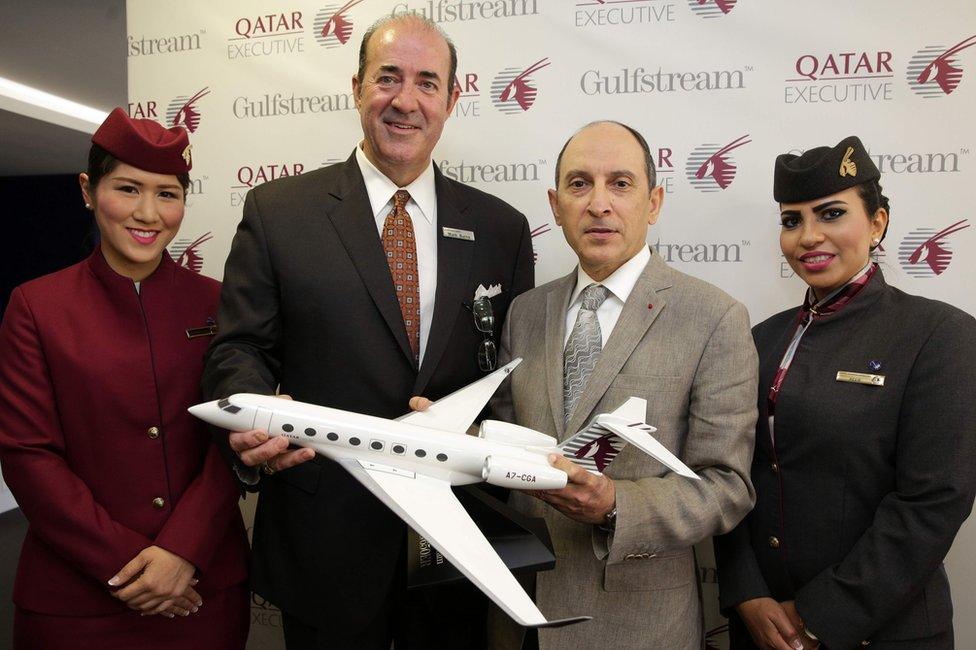
Akbar Al Baker (second from right) believes "stable minds in the political arena will prevail" when it comes to Brexit
As a big purchaser of Airbus aircraft (whose wings are made in the UK) and a 15% shareholder in IAG, owner of British Airways and Iberia (whose shares tanked after the Brexit vote), Qatar Airways is no mere outside observer.
But Mr Al Baker says that the "caution" around Brexit can be overdone. "I'm sure that stable minds in the political arena will prevail. And they will realise that regardless of whether Britain stays in the EU, they will still need each other."
He can't understand why such a momentous move was decided on a simple majority at the ballot box, rather than, say, 75%.
But in the end, common sense will prevail, he believes. "Trade both ways is massive. They both need each other. At the end of the day, you are all Europeans."
- Published12 July 2016
